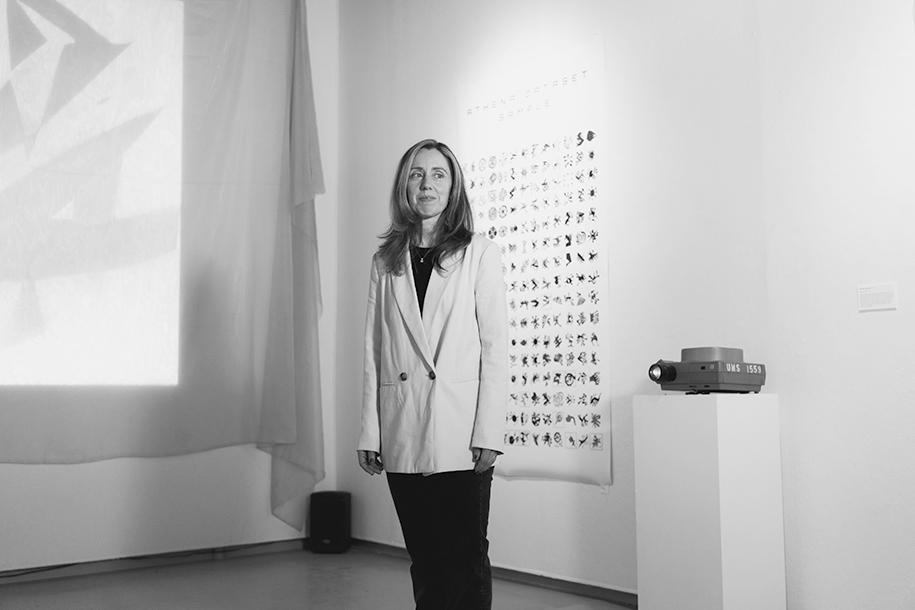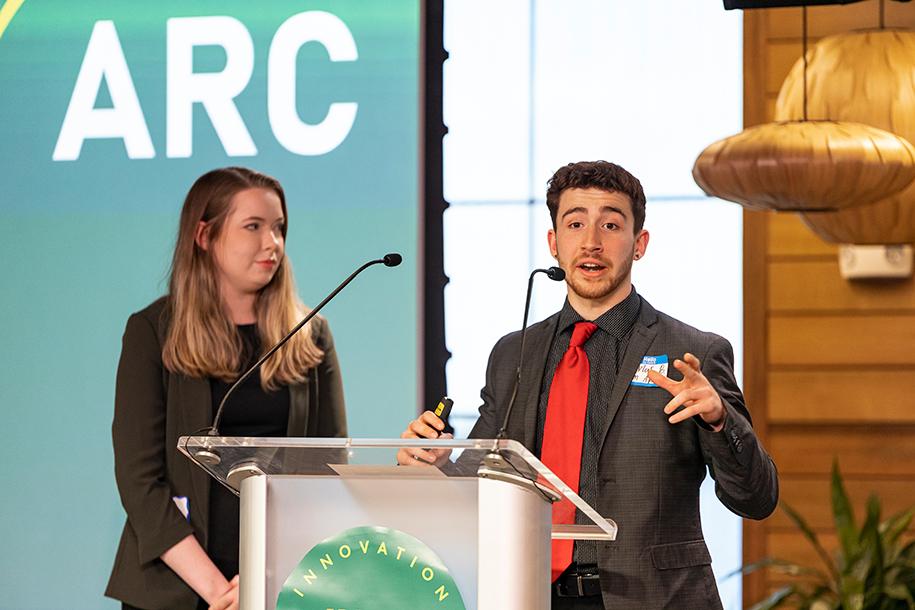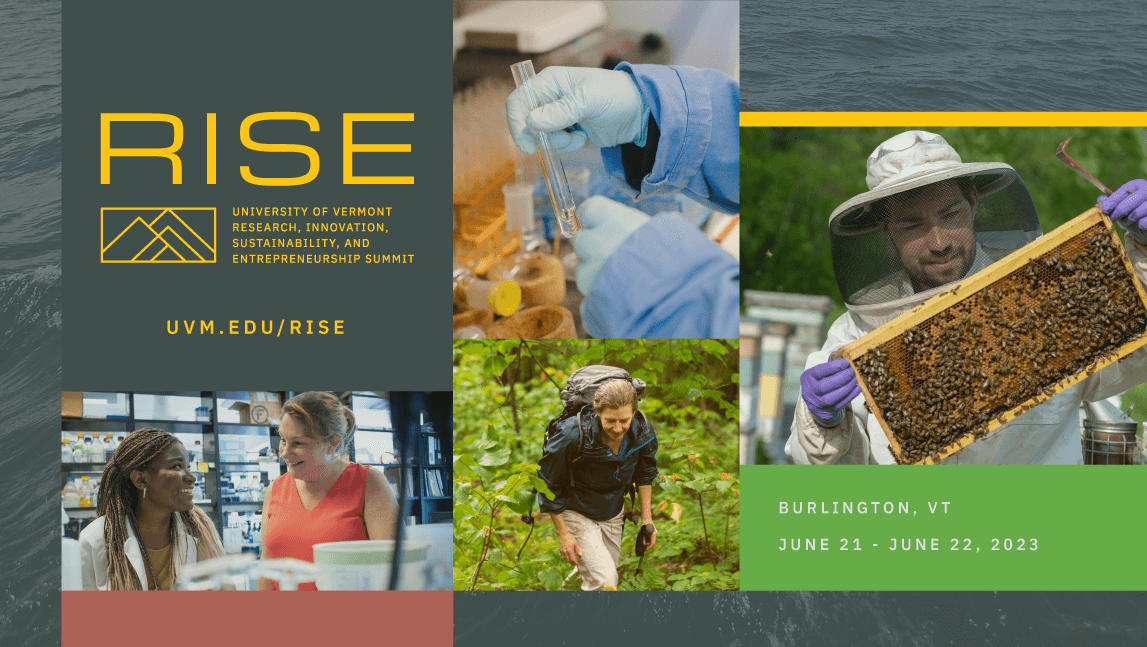The University of Vermont’s research enterprise has doubled over the last decade, from just over $106 million in sponsored research funding in 2013 to over $214 million last fiscal year. For the first time in UVM’s history, sponsored research now eclipses revenue generated from undergraduate admissions. But leaders in research, sustainability, and innovation both at UVM and beyond are now asking: how can UVM translate the research and resources it has to offer not just Burlington and Vermont but to the the country and beyond?
One answer to those questions is the new Research, Innovation, Sustainability, and Entrepreneurship Summit at UVM. RISE will bring those four pivotal elements into one event, with panels, discussions, and showcases on the research enterprise at UVM and what it can provide to local and regional entrepreneurs, how to accelerate systemic change with vital human development, and why communities need rural development not just in Vermont but across the region. RISE programming will also include entrepreneur pitch sessions, networking opportunities, performances, and art installations. Over 800 people have singed up to experience RISE at the Davis Center on June 21.
Research
With UVM now a top 100 public research university in the United States, leaders across campus have recognized the need to translate the university’s research, technology, and services to a wider audience.
“The impact of our research at UVM reverberates far beyond our campus,” UVM President Suresh Garimella said. “We live in a better world today thanks to the spirit of discovery that has been a critical part of American research universities, and UVM is proud that our research contributes directly to building healthy societies and a healthy environment.”
Spearheading UVM’s ascent into the realm of top research institutions has been the university’s Vice President for Research Kirk Dombrowski, who joined in 2020.
“Launching the RISE Summit at UVM for Vermont and the entire New England community is essential to helping catalyze our existing resources, from high-end technology development to clinical translation of medical/cancer research, to new energy paradigms being developed here in Vermont in collaboration with local utilities and technology companies,” Dombrowski said. “It has always been important to the university to reach out to the communities of Vermont. The summit and the work that will follow will bring UVM’s support to those community initiatives, early-stage businesses, and vital non-profits in meaningful ways.”
Along with introducing the RISE Summit, Dombrowski is also moderating panels and keynote presentations like Dominic Endicott’s “Vermont Knowledge Corridor: How Burlington and UVM Can Deliver Sustainable Growth” and Sen. Patrick Leahy’s “State of the State” address.
Innovation
Beyond its typical depiction in the realm of business and entrepreneurial pursuits, innovation can often come in the form of artistry and creative pursuits.
Jenn Karson — a lecturer in UVM’s College of Arts and Sciences and the director of the university’s FabLab — has been pushing the boundaries of artistic expression. Her current work is focused on intermedia artist-made datasets, utilizing the Vermont Advanced Computing Center to process and create multi-dimensional artwork.
“Artists are the antennae of society, with uncanny abilities to sense and envision the future. They serve as the vanguard of cultural and societal change, interrogating the status quo,” Karson, said. “Artists embrace disruption, challenge conventional boundaries, explore uncharted territories, and develop novel problem-solving approaches. They ask the questions no one else is asking and do so with passionate idealism.”

Karson — along with Sonja Lunde, director of the Fleming Museum and Russ Scully, owner and developer of Hula — will be speaking at RISE on why culture and creativity are powerful assets for a vibrant economy.
Karson continued, “On a practical level, there's plenty of evidence in Vermont that cultural events that depend on artists' work, like local theatre, music festivals, art galleries, and museums, draw visitors and generate revenue for local businesses, including restaurants, hotels, retail establishments, and participating artists.”
Sustainability
In any enterprise, research and innovation themselves are worthwhile pursuits; however, endless, unchecked innovation can sometimes come at the expense of the environment, which is why another focus of RISE is UVM’s commitment to sustainability.
Mads Almassalkhi — an associate professor in the College of Engineering and Mathematical Sciences and co-founder of the PacketizedEnergy startup — researches sustainability and optimization in power systems and understands just how important sustainability is for any organization.
“In our research groups, we are actively researching how to integrate more renewables into the grid, how to improve grid reliability, and how to automate and make better decisions about energy usage on the grid and in the home. Over the past 10 years, UVM has been a hub for impactful energy innovation and research with our work directly helping to make the grid smarter and more reliable for Americans and Vermonters,” Almassalkhi said. “We are now working closely with Vermont's forward-leaning energy industry, such as Vermont's transmission system operator VELCO, the nation's mighty national labs, such as Pacific Northwest National Lab and social scientists and Gund Institute on the Environment to consider a more holistic approach to energy resilience, innovation, and technology development that not only minimizes energy costs and CO2 emissions, but does so in a way that includes diverse stakeholders views and shares the benefits of a cleaner, greener, and more resilient grid equitably, so that we all benefit from excellence in the green transition.”
Almassalkhi — along with Thor Sigfusson, Founder and Chairman of Iceland Ocean Clusters, Torben Orla Nielsen science attaché for Innovation Centre Denmark, and Heather Darby, an agronomist at UVM Extension — will be speaking at RISE about UVM’s commitment to sustainability and maximizing green resources for the future.
Entrepreneurship
The last — but certainly not the smallest — component of RISE focuses on the entrepreneurial spirit at UVM and the greater Burlington region. Thanks to programs like Academic Research Commercialization (ARC) and the Catamount Innovation Fund, faculty and students can bring ideas, products, and research to market.

“In my opinion, building a mission-driven startup in a place like Burlington with a supportive community, natural beauty, and lots of great recreation is the best way to live a life that is as enjoyable and impactful as possible,” Bagdon said. “Deciding to dive into the world of technology-driven entrepreneurship at UVM and the broader Burlington community has been the most meaningful and deeply satisfying thing I have ever done. I am so grateful to those who have supported this vibrant ecosystem and I am excited to see exciting new support mechanisms and events like the RISE Summit.”
UVM’s first RISE Summit will take place June 21-22 at the Davis Center. Registration is free and open to the public.
